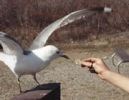
FOR THEIR SAFETY AND YOURS In recent years Big Cypress Resource Management staff has noted an increase in the number of interactions between humans and wildlife at the preserve, such as alligators, birds, and squirrels. These interactions seem to be connected by animals receiving food as a reward for their willingness to come close to people. The problem is one of human behavior--people feeding wildlife, people not disposing of trash properly, people leaving food unattended at campgrounds and rest stops, and people leaving food scraps behind. Food reward that animals associate with humans can result in their loss of fear of humans. This change in behavior may lead to property damage and human injury. For the animals involved it may mean negative health effects or overpopulation resulting from unnatural food sources, dependence on a seasonably unreliable food source, and greater susceptibility to predators and vehicle collisions. DON’T FEED OR APPROACH WILDLIFE |
Last updated: April 14, 2015
